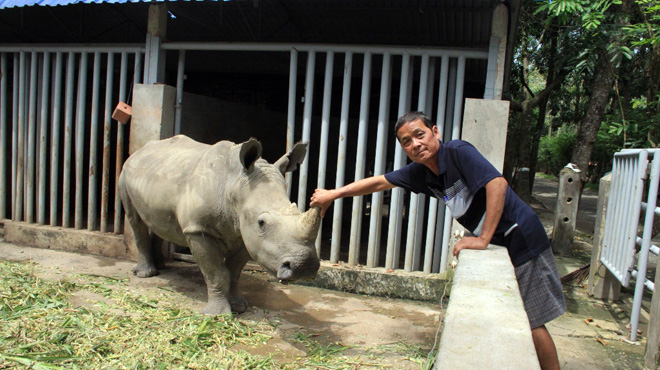A public communication campaign launched last year to raise awareness of the misbelieved medicinal properties of rhino horn in Vietnam seems to have worked as poll results released on Thursday show demand for the substance has dipped sharply in the Southeast Asian country.
In August last year, the Humane Society International (HSI) joined hands with the Vietnam Convention on International Trade in Endangered Species of Wild Fauna and Flora Management Authority to mount a public education and awareness campaign against the use of rhino horn, which is falsely believed by many to be a kind of medicine.
Pre- and post-campaign polls conducted by the Vietnam business of the international public polling firm Nielsen revealed a dramatic reduction in public demand for rhino horn in the country, the HIS said on its website.
Since the campaign launch, demand for the substance has dropped by 38 percent, according to the poll results.
“Only 38 percent of the national population and 21 percent of people in Hanoi continue to think that rhino horn has medical value, a 51 percent and 53 percent decrease respectively from last year,” the HSI said, citing Nielsen Vietnam findings.
Sixty percent of the people who think rhino horn can cure diseases believe it can treat cancer, while the remaining 40 percent hold a belief that it can cure their rheumatism, a medical problem affecting joints and connective tissues.
Vietnam is the world’s biggest consumer of rhino horn, according to the HSI, which works to protect all animals, including laboratory & farm animals, companion animals, and wildlife.
With a focus on Hanoi, the campaign engaged stakeholder groups including the 800,000-strong Hanoi Women’s Association, the business community, university students, school children, and the scientific community, as well as many leading health experts, to help spread messages against the use of rhino horn, according to the HSI.
The campaign handed over copies of an HSI book, "I’m A Little Rhino," to young students to read as part of their curriculum, whereas advertisements appeared on billboards within the city, at the airport, and on the sides of city busses.
Local media also took their part by running hundreds of press articles to further spread the campaign messages throughout the country.
Teresa M. Telecky, director of the wildlife department of the HSI, said the poll results offer “a vital ray of hope” for the survival of rhinos.
“Insatiable demand for rhino horn is driving rhinos to the brink of extinction, so reducing that demand is absolutely crucial,” he said in a statement.
“These poll results demonstrate that even in a relatively short period of time, our demand reduction campaign has succeeded in significantly and dramatically altering public perception and influenced behavior.”
Like us on Facebook or follow us on Twitter to get the latest news about Vietnam!





















































